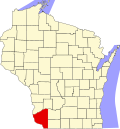Rutledge, Wisconsin | |
|---|---|
| Coordinates: 42°33′17″N90°38′01″W / 42.55472°N 90.63361°W | |
| Country | |
| State | |
| County | Grant |
| Town | Jamestown |
| Elevation | 614 ft (187 m) |
| Time zone | UTC-6 (Central (CST)) |
| • Summer (DST) | UTC-5 (CDT) |
| Area code | 608 |
| GNIS feature ID | 1577804 [1] |
Rutledge is an unincorporated community located in the town of Jamestown, Grant County, Wisconsin, United States. [1]


